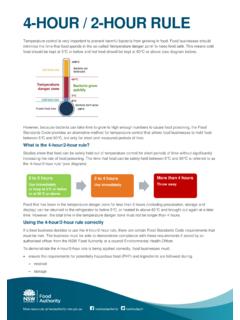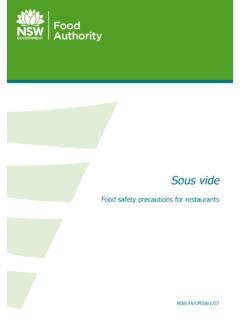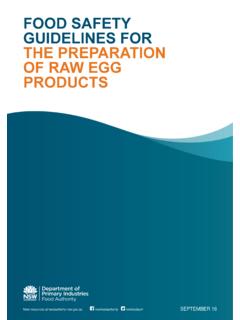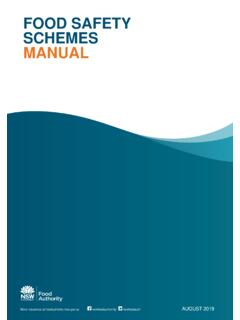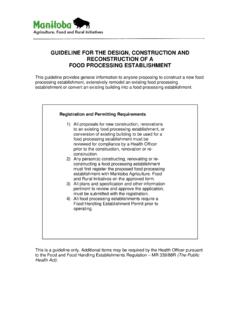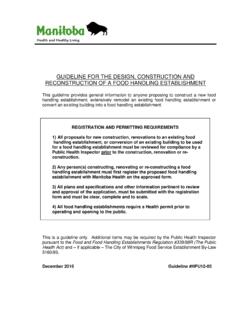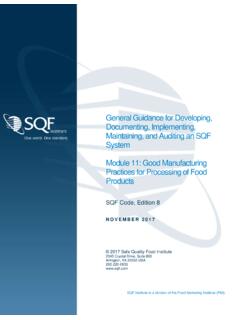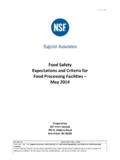Transcription of GUIDELINES FOR MOBILE FOOD VENDING VEHICLES
1 GUIDELINES FOR. MOBILE food . VENDING VEHICLES . More resources at nswfoodauthority nswfoodauth JANUARY 2017. 2. Contents Introduction .. 4. What are MOBILE food VENDING VEHICLES ? .. 4. Obligations on selling food .. 4. Which agencies enforce the Act and Code? .. 5. Charities and community 6. 7. 7. Licensing .. 7. Council approvals .. 7. food Safety Supervisor .. 7. Inspections .. 8. Fees and charges .. 8. Conditions of operation .. 9. Maintenance .. 9. Garbage and recyclable matter .. 9. Animals and pests .. 9. Children in food preparation areas .. 9. Water and ice .. 9. Waste disposal .. 9. Electricity, gas supplies, fire extinguishers and work safety.
2 10. Pollution prevention .. 10. 11. Construction of vehicle .. 11. Floors .. 11. 11. Ceilings .. 12. Door and serving openings .. 12. Pipes, conduits and wiring .. 12. Equipment and appliances .. 12. Lighting .. 12. 12. More resources at nswfoodauthority nswfoodauth 3. Hand washing facilities .. 13. food handling .. 14. food suppliers .. 14. Preparing food at home .. 14. food storage .. 14. Potentially hazardous foods and temperature control .. 14. Cross contamination .. 15. food display .. 15. Crockery, wrappings and packaging .. 16. Single-use items .. 16. Skills and knowledge .. 16. food Safety Supervisor .. 16. Staff illness.
3 16. Requirements for food handlers .. 17. Hand 17. Money handling/touching customers' hands when serving food .. 17. Cleaning and sanitising .. 17. Labelling .. 18. Checklist for MOBILE food vendor VEHICLES .. 20. Contact information .. 23. Key definitions .. 24. Note: This is a guidance document only and cannot cover all situations. food businesses are required to comply with all of the provisions of the food Standards Code and the food Act 2003 (NSW). More resources at nswfoodauthority nswfoodauth 4. Introduction These GUIDELINES inform businesses selling food from a MOBILE VENDING vehicle in NSW of their legal requirements in relation to the NSW food Act 2003 (the Act) and the food Standards Code (the Code).
4 They provide information on basic requirements such as power supply and waste disposal, and suggest ways to maintain food safety. Businesses and enforcement agencies (local council environmental health officers (EHOs) in most cases) can use this guide to assess compliance with the Act and the Code. The primary aim of these GUIDELINES is to make food businesses aware of their legal requirements and to suggest ways to assure food safety when selling food . This guideline also provides businesses with a guide to applicable fees and charges that councils may levy. Potential MOBILE food vendors should contact the local council prior to operating to check if a permit is needed by the council, if an inspection must be completed, if there are any applicable fees and/or if there any other restrictions which may be relevant.
5 What are MOBILE food VENDING VEHICLES ? A MOBILE food VENDING vehicle is any means of transport, whether self-propelled or not or otherwise designed to be movable from place to place, and which is used for selling food , whether on land, sea or air. It includes VEHICLES used for on-site food preparation ( hamburgers, hot dogs and kebabs), one-step food preparation ( popcorn, fairy floss, coffee and squeezing juices), and the sale of any type of food including pre- packaged food . It does not include food VENDING machines or food transport VEHICLES . These GUIDELINES cover all types of MOBILE food VENDING VEHICLES . They are comprehensive and the checklist provided within the document can be used to double check compliance with the council requirements.
6 There are minimal requirements for MOBILE food VENDING VEHICLES selling only pre-packaged, low risk food . Obligations on selling food A person using a MOBILE food VENDING vehicle to store, prepare or sell food for human consumption, is deemed to be a food business'. This includes not-for-profit operations. The Code defines a food business as any business or activity that involves the sale of food or the handling of any type of food for sale in Australia, with the exception of some primary food production activities. A food business is required to sell safe and suitable food in accordance with the provisions of the NSW food Act 2003, food Regulation 2015 and food Standards Code.
7 Note that food premises' includes VEHICLES '. Copies of the food Standards Code (particularly food Safety Practices and General Requirements and food Premises and Equipment) are available on the food Standards Australia New Zealand website at More resources at nswfoodauthority nswfoodauth 5. Failure to comply with the requirements may lead to enforcement action. Depending on the food safety risk identified, this action may include a warning letter, improvement notice, penalty notice, seizure, prohibition or prosecution. The NSW food Authority and councils generally follow an escalating enforcement policy. For more information see Which agencies enforce the Act and Code?
8 In most cases, local councils are responsible for the food surveillance of the retail sector and enforce the requirements of the Act and Code; this includes food for retail sale from MOBILE food VENDING VEHICLES . The food Authority is only responsible for surveillance if there is processing of products that require a licence at that premises; such as: businesses that conduct food service to vulnerable persons high risk plant product businesses businesses that handle or process meat businesses that further process seafood businesses that handle shellfish dairy producers, factories and vendors businesses that produce or process eggs and egg related products More resources at nswfoodauthority nswfoodauth 6.
9 Charities and community groups Charities and community groups are those which do not derive funds for personal financial gain, but direct any profits back to the community ( local sports clubs, Lions and Rotary clubs). The food Act 2003 (NSW) and food Standards Code apply to all food businesses including those selling food for charity or community purposes. It is always an offence to sell food that is unsafe or unsuitable. Charities and community groups are exempt from some requirements: Notification of food business is not required if food sold is not potentially hazardous ( scones) or is to be consumed immediately after thorough cooking ( sausage sizzle).
10 food Safety Supervisor requirements do not apply Some labelling requirements do not apply, however, it is a requirement to provide information to customers on request about these allergenic ingredients: o Cereals containing gluten o Crustacean and their products o Fish and fish products o Egg and egg products o Milk and milk products o Peanuts and peanut products o Sesame seeds and sesame seed products o Soybean and soybean products o Tree nuts and tree nut products Further information can be obtained from the NSW food Authority or local councils. More resources at nswfoodauthority nswfoodauth 7. Administration Notification food businesses must be notified to the appropriate enforcement agency.


